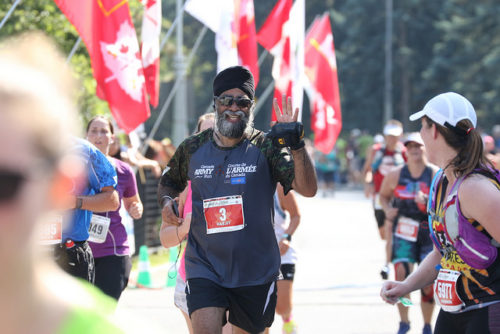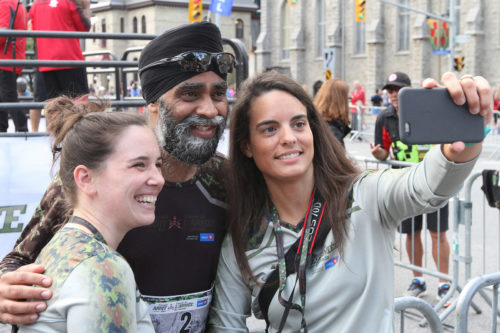Mark Sutcliffe talks to the honourable Harjit Sajjan about morale, half marathon training plans and what it feels like on a run when a serviceman’s child gives you a high-five.
As he travels around the world as Canada’s minister of national defence, and shuttles regularly back and forth between the capital and his Vancouver riding, Harjit Sajjan says his body sometimes loses track of what time it is. So perhaps it’s not a surprise that you can often find him running at 11:00 p.m. on the recreational pathways of Ottawa.
“I don’t really get settled into one time zone,” Sajjan says. “Sometimes “ instead of going to sleep, I just go for a run. I just have to get out and do it. That’s what works for me.”
Sajjan says he has run as late—or as early—as 2:00 a.m. “For some people, it doesn’t work, but I actually can sleep just fine afterwards. And if I don’t do it at that time, it’s not going to happen. Even if I go at midnight, I just have to get out and keep with my schedule.”

When Sajjan was named to the federal cabinet in November 2015, several media reports portrayed him as the “badass” defence minister, sharing pictures from his past military and police service. Born in the Punjab region of India, Sajjan moved to Canada at the age of five. He served for 11 years in the Vancouver Police Department, including as a detective in the gang crimes unit. During his military career, he was deployed three times to Afghanistan.
Sajjan says he has always tried to live a healthy lifestyle. And like many members of the military, he ran for fitness. He participated in the Vancouver Sun Run and other 10K events. But he didn’t fully embrace running until about five years ago, when members of the regiment he was commanding signed up for the half marathon at the Scotiabank Toronto Waterfront Marathon and asked if he would join them.
“I always encouraged our members to do more and so since they asked me, I said sure.” Sajjan says he didn’t follow a specific training program, so although he completed the race in just under 1:49, it took a toll. “I was wiped!” he says.
“It was only after, when my kids were laughing at me and I was hurting in muscles where I didn’t even think I had muscles, that I Googled: how do you train for a half marathon?” Sajjan says. “I realized: oh my God, there’s so much science behind it. That’s when I really got smarter about it. I realized I was running way too much and going way too hard.”
Sajjan registered next for the Canada Army Run, followed a training plan to the letter and finished a few minutes faster than in his debut half-marathon. “And I felt really good when I finished,” he says.
Along the way, Sajjan says he learned many lessons about training and the benefits of exer- cise that can be applied to the demanding lives of Canadian soldiers. “In the Armed Forces, we’re getting smarter about how we train people. We’re looking at the science of how you build someone up, what kind of jobs they do and what abilities are needed.”
Naturally, Sajjan is a big supporter of the Army Run and the causes it supports, Soldier On and the Support Our Troops fund. “The first time I ran, it was a tremen- dous experience,” Sajjan says. He remembers a specific soldier who had been injured in “ Afghanistan but ran the entire race pulling a tire behind him. “When you’re talking about the challenges this person faced, it was amazing. You get so much out of it because you’re seeing other people beat the odds.
“For the members [of the Armed Forces] who are there and running, what it demons- trates physically is how appreciative Canadians are to the Armed Forces and the services they provide. It’s a great way to say thank you to their families as well. There are kids of service members high-fiving you and it demonstrates to them that Canada does care. That’s the one message that’s very important to me: to remind them how far Canadians will go out of their way to show the military that they care.”

Sajjan has heard from many civilians who finished the Army Run about how much they were inspired by running alongside injured soldiers. “When you have some difficulty in your job or something else, you have that memory of a soldier in a wheelchair going uphill or someone with an artificial limb from an injury overseas and all those memories come back and you think, ‘If that person can do it, I’m going to keep going in my own life.’”
When he’s not in Canada, Sajjan has run in some interesting places and, like at home, at some unusual times.
“Once I landed in Ethiopia and I ran on a treadmill. I felt really tired and someone came up to me and said, ‘You realize the altitude you’re at?’ And I said, ‘Oh, I guess I’m not that out of shape.’”
Sajjan has also run in Kiev, Rome and on Canadian bases overseas. “Any opportunity when I land, regardless of the time, I get out there and get in a workout and it gets me into a proper rhythm.”
So what does this “badass” former soldier and cop listen to when he’s running? “I’m embarrassed by this,” he jokes, “but my running must is all trance music. It’s a very particular Euro trance with a certain beat. My wife always laughs that it’s the same beat, that it’s the same song over and over again. But that’s the point. I want a certain cadence and I take my mind right out of it and away I go.”
Sajjan says he also listens to audio books, including science fiction. And sometimes he leaves the earphones at home and uses running to clear his mind. “I like to get myself pumped for things,” he says, “to get myself motivated. And also, when you’ve had a tough day or you’re frustrated about something, I run it out of my system. It really clears the mind and gets you more focused, and you’re able to think a lot more about the next day.”
Find more inspiring stories, race updates and so much more in our Spring issue now available!






 Our Magazine
Our Magazine
